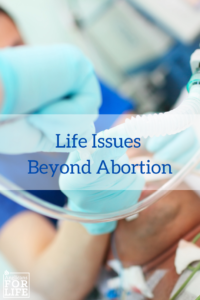Editor’s note: This week, we welcome Summit 2021 Workshop speaker Julie Grimstad, one of our virtual Summit 2021 Workshop Speakers, to the blog desk. Julie is the president of Healthcare Advocacy and Leadership Organization (HALO), whose mission is to promote, protect, and advocate for the rights of the medically vulnerable.
We visibly love vulnerable patients, and this is a witness to the world. We help people navigate the increasingly perilous healthcare system. We defend healthcare providers who listen to the voice of God (their consciences), refusing to participate in unjust denial of care and intentional killing.
A large part of HALO’s mission is to increase public awareness of life issues beyond abortion. This is a significant challenge because even people who are pro-life on abortion often are unaware of other crucial life issues. We educate people through our publications, 24/7 Helpline, and patient advocacy training.
I want to impress on you how real the problems we confront in the healthcare system are.
Many people implicitly trust their doctors and nurses. We don’t want to unduly frighten anyone because many doctors and nurses can be trusted. However, it is wise to be wary because there are also many who cannot be trusted.
One of our most popular publications is Making a Difference: A Guide for Defending the Medically Vulnerable – 16 pages of information you need to help you protect yourself or a loved one in various healthcare situations.
For example, most people do not know they should carefully check out a hospice BEFORE admission. Making a Difference provides a list of questions to ask a hospice before admission. Unless hospice care is provided by people who truly respect life, it can be dangerous. Hospice is the ideal setting to disguise killing as “comfort care.” A typical report from grieving family members is that their loved one, who had been alert and was not complaining of pain, was administered increasingly frequent and larger doses of pain medications and sedatives to the point where they were sleeping all the time and could not eat or drink. Some reported that patients were also denied their usual medications to control blood pressure, diabetes, etc.

A large chunk of our work is dealing with denial of care. Do you know that your hospital likely has a “medical futility policy”? These policies permit doctors and hospital-appointed ethics committees to decide to stop life-sustaining treatment against a patient’s/family’s wishes. In my experience, it is frequently the patient’s life that is considered “useless,” not the treatment. Such medical futility decisions assault human dignity.
Texas, where I now live, has a terrible “medical futility” law. I attended an ethics committee meeting with the mother of a young woman, Jenna (name changed for privacy), who was severely disabled from a stroke. The doctor claimed Jenna was unresponsive. However, just that morning, an attorney had videotaped Jenna responding to her mother’s and my questions and requests by nodding her head “yes” that she wanted to live and moving her feet and blinking her eyes on command. The hospital’s attorney prevented us from showing this evidence to the committee because we did not have permission from the hospital administrator to take pictures of a patient! The doctor told the mother that she would be better off if her daughter died instead of having to care for her, possibly for many years! So, obviously, she was not near death. The hospital wanted to kill her. Fortunately, her mother, with help from patient advocates, was able to move her daughter to another facility and save her life.
Every time I’ve been involved in a “medical futility” case, I’ve been stunned by the callous disregard for human life displayed by doctors and hospitals.
COVID-19 has exposed the vulnerability of the elderly and disabled, particularly when healthcare resources are considered “scarce.” We were all appalled at the death toll in New York nursing homes. And an example of deadly discrimination against the disabled occurred in Texas: “Michael Hickson, a 46-year-old COVID-19 patient, was starved and left without adequate treatment for his illnesses at St. David’s South Austin Medical Center. His wife, Melissa, says the hospital refused to treat his illnesses because of his disability.” (Texas Right to Life, June 26, 2020)
HALO is necessary because vulnerable patients, like Jenna and Michael, and their families need someone to be a voice for them.
Julie is part of an amazing roster of speakers you can see at Summit 2021. Since it’s presented virtually, you can watch it from anywhere you have internet access!
